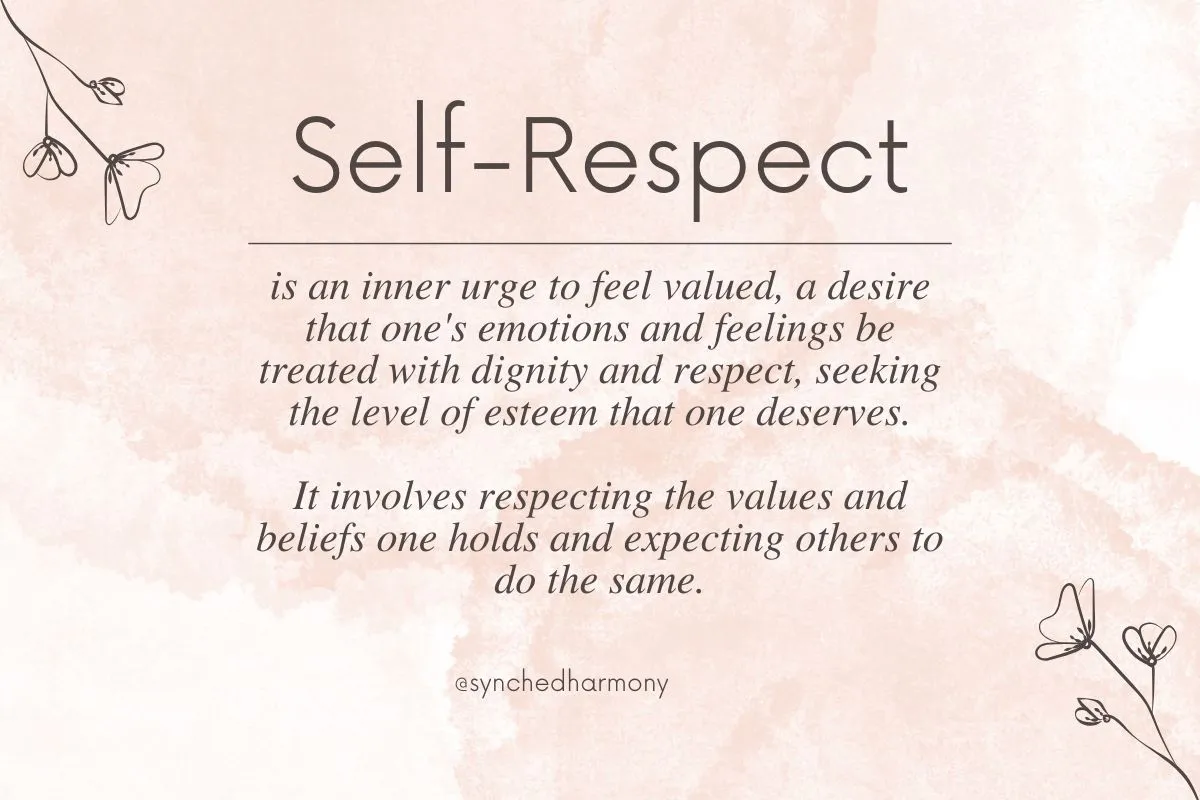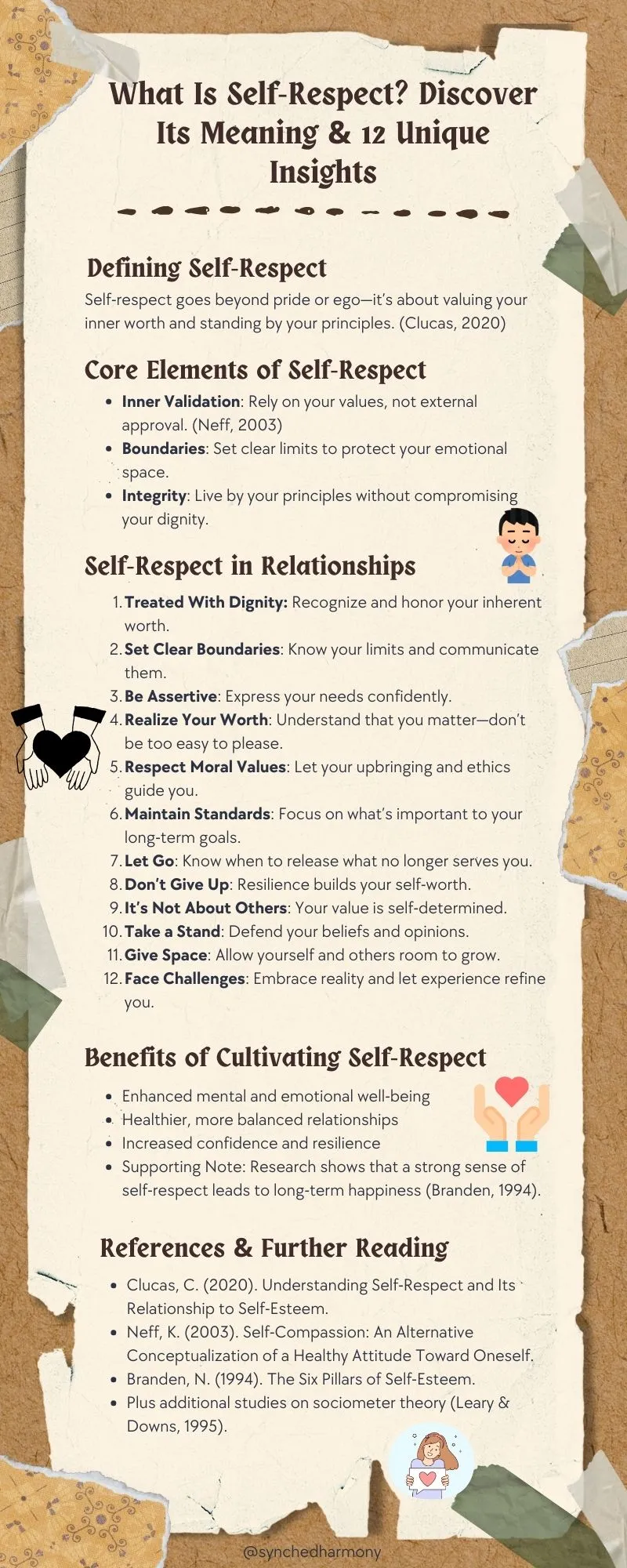Self-respect is a term that has been misunderstood widely, with individuals interpreting it differently based on their perspectives. For some, it pertains solely to pride and ego, while for others, it embodies a deeper sense of dignity and self-worth.
Each person has formulated their custom definition of self-esteem and self-worth as per their understanding. In the context of self-worth in a relationship, it often becomes a significant issue and is frequently misused, leading to strains within the relationship.
In this article, we endeavor to comprehend the true essence of self-respect and discover its true meaning within the language of relationships.
What is Self-Respect?
Defining self-respect can be challenging due to its subjective nature and the variations it can encompass according to different perspectives and contexts. How it is viewed in specific situations or a circumstance holds significant importance to its meaning.

Self Respect Definition
Discussing what is self-respect is indeed a broad question with no single definitive answer. However, I will attempt to define it based on my understanding and experience on the subject.
I define self-respect as an inner urge to feel valued, a desire that one’s emotions and feelings will be treated with dignity and respect, seeking the level of esteem that one deserves. It involves respecting the values and beliefs one holds and expecting other people to do the same.
The role of the inner urge for validation in self-esteem is astute. Indeed, seeking validation and feeling valued are fundamental human needs. Self-respect primarily revolves around the self rather than others. It is crucial to perceive it from our perspective rather than allowing others to define it on our behalf.
Research by Clucas (2020) on “Understanding Self-Respect and Its Relationship to Self-Esteem. Personality and Social Psychology Bulletin“ demonstrates that self-respect plays a distinct and vital role in shaping self-esteem, emphasizing the importance of adhering to one’s values.
Indeed, it’s not about showcasing superiority over others but rather, it’s about communicating that you operate within a framework of principles and values. Crossing the line of this framework goes against your principles, and others need to understand and respect this boundary.
Understanding Self-Worth – Why is it Important?
Self-worth is the foundation of personal integrity and emotional well-being. It reflects an individual’s recognition of their worth and their ability to stand by their principles and values, even in challenging circumstances. Unlike ego, which often seeks validation through external comparison, self-worth is deeply rooted in self-awareness and self-acceptance.

Key Aspects of Self-Worth
- Valuing Yourself: At its core, self-worth is about acknowledging your intrinsic value and treating yourself with kindness and dignity. This includes refraining from self-criticism that undermines your confidence and setting realistic standards for personal growth.
- Setting Healthy Boundaries: A significant element of self-esteem is establishing and maintaining boundaries. This helps protect your mental and emotional space, ensuring relationships are built on mutual respect.
- Living with Integrity: Self-worth involves aligning your actions with your core values. Doing so creates a life that feels authentic and fulfilling, reducing regret and self-doubt.
- Cultivating Assertiveness: Assertiveness is key to preserving self-respect. By confidently expressing your needs and opinions, you maintain your boundaries without disregarding others’ feelings.
Verywell Mind (2022) highlighted that a strong sense of self-respect is linked to improved emotional well-being and healthier relationships. It is indeed a profound step towards building self-worth.
Also Read: Assertiveness Communication: 7 Effective Ways to Be Assertive Without Being Aggressive
12 Unique Insights on Self-Respect in Relationships
When discussing self-respect within the context of a relationship, its meaning undergoes significant changes. However, below are 12 unique insights that will help us define self-esteem in relationships:
- Treated With Dignity: A fundamental human need is to be treated with dignity. The core meaning of dignity lies in recognizing and respecting the inherent worth of every individual. Being treated with dignity epitomizes the true essence of what is self-respect in a relationship. If someone’s dignity is not acknowledged in a relationship, it directly undermines causing significant harm to their self-respect.
- Setting Up Boundaries: self-worth is essentially about setting up boundaries. I say that having a line is crucial when it comes to self-worth. You can perceive it akin to a tolerance limit where you define the extent to which you can tolerate any particular behavior. Breaching of this threshold can be considered as hampering your self-esteem.
- Being Assertive: I firmly say that being assertive is one of the most crucial aspects of maintaining self-worth in a relationship. You can uphold your self-esteem only when you express yourself assertively. Until you vocalize your concerns, others may not be able to comprehend that your self-respect has been compromised, and they may continue to disrespect you.
- Realizing Your Worth: I believe that conveying one’s worth to others and understanding own worth are also crucial aspects of self-worth. I would advise you not to be too easy to please, as others may start taking advantage of you. In a relationship, you hold significance, you are an entity that defines the relationship, so recognize that significance.
- Respecting Moral Values: If you have received a good upbringing and possess unwavering courage, then no one can easily harm your self-respect. If you are clear about what matters to take seriously and which ones you can ignore without much thought, then you can automatically safeguard your self-respect. Things that are not considered important according to your moral values and beliefs should not matter to you.
- Maintaining Standards: Getting emotionally involved in trivial matters and allowing them to harm your self-esteem will not help you define your self-worth. Have a vision in life and strive to achieve your goals. If a certain matter is trivial in comparison to those goals, do not let it affect you, as doing so will ultimately impact your ability to achieve those goals. Instead, preserve your self-worth and let your success speak for itself.
- Letting Go: Letting Go and not holding on unnecessarily is another important aspect of defining what is self-respect in a relationship. Do not diminish your worth by trying to please those who are not deserving of it. Sometimes, it is better to let go of something because the more you try to hold onto it, the further it drifts away from you, causing harm to your self-esteem. Therefore, let go, forgive, and forget.
- Not Giving Up: The strength of your self-worth depends on your determination to not give up. The spirit of restarting even after a defeat is what cannot be broken. Often, it is just one loss that shatters people’s morale, making them feel weak and reducing their tolerance limit, making it easier for others to overpower them. Therefore, if you maintain a never-give-up attitude, people will not be able to break your self-confidence, and that is what truly matters.
- It’s Not About Others: It is important to understand that your self-worth is not determined by others but by yourself, correct? No other person can tell you that your self-respect is being compromised; rather, it is something you must assess for yourself. Many times, people try to engage in actions that may jeopardize your mental peace. Therefore, realize that your self-esteem is in your hands, and do not lose it by succumbing to the influence of others.
- Taking a Stand: Your self-worth also depends on how much you stand up for yourself. Having a personal opinion in a relationship is crucial; you cannot always agree in every circumstance. Sometimes, you will need to take a stand for your own beliefs and also listen to your partner’s opinion, respecting their views. Therefore, taking a firm stand can help you define your self-worth.
- Giving Space: Giving enough space to your partner is indeed a crucial aspect of a relationship. If you provide them with sufficient space and refrain from over-pursuing them until they naturally desire to return, it can aid in maintaining your self-respect. It inherently means putting in effort but also at the same time knowing when to stop.
- Face Challenges: Lastly, it’s about facing challenges. If you confront challenges head-on without succumbing to fear, your mental strength will automatically increase. When you face challenges, you get a taste of reality. And when you confront reality, your ego naturally takes a back seat, putting you in a position to define your self-worth.
Quick Facts:
- A study by Neff, K. (2003). Self-compassion: An alternative conceptualization of a healthy attitude toward oneself suggests that self-compassion provides an alternative to seeking external approval.
- Drawing on Branden’s (1994) foundational work, self-respect is seen as rooted in practices like self-acceptance and living in alignment with one’s values.
- A Crucial aspect lies in determining the height of this tolerance limit. If this limit is significantly lower compared to your patience level, then anyone breaching this limit would first hamper your ego rather than your self-esteem. Therefore, your patience level must be sufficiently high, and this tolerance limit should always remain above it so that you can comfortably preserve your self-respect without bringing your ego in between.
- Being assertive is essential, but it should not be mistaken for being loud or bossy. You can effectively communicate your point while maintaining decorum and showing appropriate behavior.
Also Read: Self-control is Strength. Calmness is Mastery. You – Tymoff – 10 Powerful Reasons

Conclusion
To conclude, self-respect is a widely misunderstood and highly subjective term, especially in the context of relationships, where it is often easily compromised. Nowadays, many relationships end under the pretext of self-respect. Therefore, it is important to define what self-respect means in a relationship so that you can discern whether what you perceive as your self-respect is your ego.
If you found this article helpful, please share your thoughts in the comments section and consider sharing it with your friends as well. Subscribe to Synched Harmony and join our vibrant community to get more related content on motivation, inspiration, and self-help.

Greetings! I am the voice behind the thoughts presented on Synched Harmony. As an ordinary individual, I strive to live a life dedicated to achieving inner peace and serenity by cultivating harmony within and making difficult aspects of life work together in sync during tough phases of life. Life becomes much easier if we open ourselves to small changes and respect each other’s personal boundaries, creating space for shared happiness.
